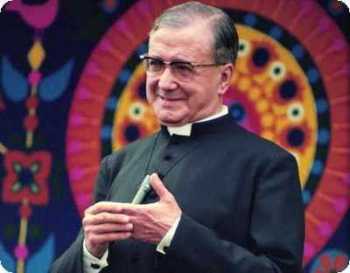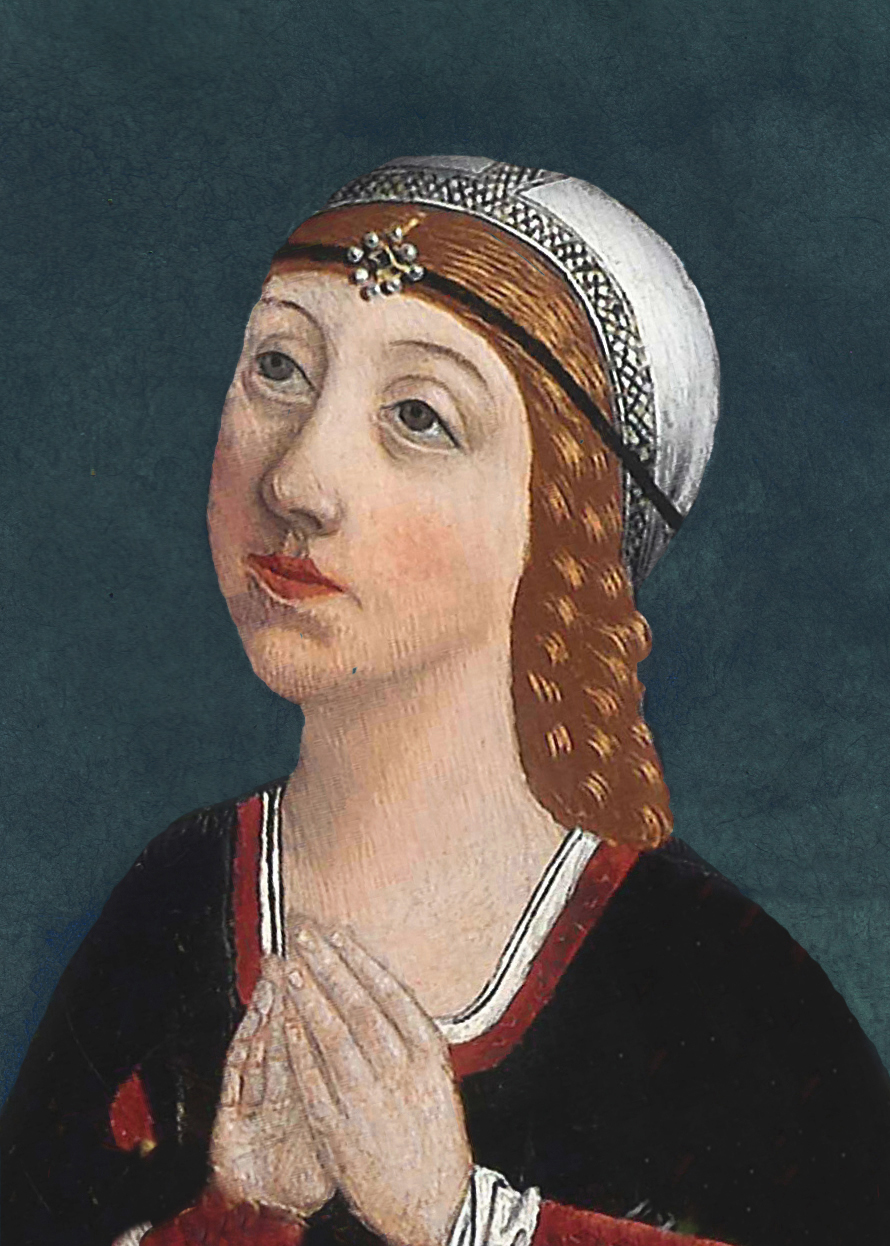October 2
Saint’s Day for Ángeles Custodios, Saturio, Teófilo and Leodegario.
1814 - Battle of Rancagua: Spanish Royalists troops under Mariano Osorio defeats rebel Chilean forces of Bernardo O'Higgins and José Miguel Carrera.
1928 - The "Prelature of the Holy Cross and the Work of God", commonly known as Opus Dei, is founded by Saint Josemaría Escrivá.

Josémaria Escrivá de Balaguer - Photo www.ebookscatolicos.com
1966 - In Madrid, The Estadio Vicente Calderón football stadium is opened.
1986 - The Spanish Congress ratifies the text of the Single European Act, which established a single European market in the first major reform of the treaties which founded the European Community – the 1951 Treaty of Paris and the 1957 Treaty of Rome.
2010 - Spanish police arrest 41 people suspected of financing FARC rebels in Colombia.
Births

Isabella was the eldest child of Ferdinand II of Aragon and Isabella I of Castile. Born during the reign of her uncle, Henry IV of Castile, the early years of her life were defined by the tension between him and her mother, as her uncle would not forgive her mother for marrying Ferdinand without his permission. Upon the death of Henry IV in 1474, Isabella's mother claimed the throne of Castile, and the young Isabella was swiftly sworn as the heir presumptive to the throne.
The early years of the reign of Isabella I were spent embroiled in a war of succession, as Henry IV had not specifically named a successor. A struggle ensued between Isabella I and her niece Joanna, who was known as "la Beltraneja" due to the rumours that she was the illegitimate child of Henry IV's queen Joan of Portugal and his favourite, Beltrán de la Cueva, 1st Duke of Albuquerque. Afonso V of Portugal, who was Henry IV's brother-in-law and young Joanna's uncle, intervened on Joanna's behalf and Ferdinand and Isabella were forced into a war with Portugal.
During the war, young Isabella witnessed some of the chaos for herself. While her parents were fighting the Portuguese, the princess was left in Segovia while the city was placed under the control of Andrés de Cabrera and his wife Beatriz de Bobadilla. The city's residents, unhappy with this new administration, rose up and seized control of the city. The then-seven-year-old princess was trapped in a tower of the Alcázar for some time until her mother returned to Segovia and took control of the situation.
The war ended in 1479 with the Treaty of Alcáçovas. Among the terms were the provision that Princess Isabella would marry the grandson of Afonso V, Afonso, who was five years younger than the princess. The treaty also provided that Ferdinand and Isabella would pay a large dowry for their daughter and that the princess would reside in Portugal as a guarantee that her parents would abide by the treaty terms. In 1480, Prince Afonso went to live in the town of Moura with his maternal grandmother Beatrice, Duchess of Viseu, and was joined in the early months of the following year by his future wife, the ten-year-old Isabella. She spent three years in Portugal before returning home.
Isabella also spent a considerable part of her youth on campaign with her parents as they conquered the remaining Muslim states in southern Spain. For example, she accompanied her mother in accepting the surrender of the city of Baza.
Her first marriage was to Prince Afonso, the only son and heir of King John II of Portugal from his marriage with Eleanor of Viseu. The wedding, by proxy, took place in the spring of 1490 in Sevilla. On 19 November of that year, Isabella arrived in Badajoz, where she was welcomed by Afonso's uncle Manuel, the future King Manuel I of Portugal, whom she would eventually marry six years after her husband's death. Afonso and Isabella were reunited in Elvas on 22 November and, on the following day, Isabella met her mother-in-law, Queen Eleanor, in the Convento do Espinheiro in Évora, where the court had gathered to ratify the marriage that had been celebrated earlier in Sevilla
Though the marriage had been arranged by the Treaty of Alcáçovas, the marriage quickly became a love match. Isabella proved a popular figure with the Portuguese royal family due to her knowledge of their language and customs brought about by the years she spent in Portugal as a child. Isabella's happy life in Portugal came to an abrupt end in July 1491, however, when Afonso was killed in a riding accident. She was heartbroken and later became convinced that he had died because God was angry that Portugal had provided a refuge for the Jews that her parents had expelled from Spain.
She was eventually sent back to Spain at the request of her parents, and Isabella returned to them devoutly religious. She underwent efforts to starve and scourge herself, something she would do for much of the rest of her life as part of her mourning for Afonso. She also declared that she would never marry again. Her parents seem to have humoured her declaration at first, but after the death of John II of Portugal in 1495, he was succeeded by Manuel I of Portugal, who immediately sought Isabella's hand. Ferdinand and Isabella, perhaps trying to respect their daughter's wishes, offered him the hand of one of their younger daughters, Maria, but he refused. There remained a stalemate between them until Princess Isabella agreed to marry Manuel on the condition that he expel all Jews from Portugal who would not convert to Christianity. He agreed to her ultimatum and they married in September 1497
In the same year as her second marriage, Isabella became Princess of Asturias and heir presumptive of the Crown of Castile following the sudden death of her only brother, John, Prince of Asturias, in September 1497, and the stillbirth of his daughter. Philip of Austria, the husband of Isabella's younger sister Joanna, claimed the crown, although Isabella had precedence as the eldest daughter. The Catholic Monarchs, to counter the pretensions of their son-in-law Philip, held courts in the city of Toledo in 1498 a few months after the death of their son John and had Isabella and her husband Manuel sworn as the legitimate heirs presumptive. The royal family then went to Zaragoza to convene the courts of Aragon for the same purpose. Although female succession was permitted in Castile, Ferdinand II's kingdom of Aragon hesitated to accept a woman as their future ruler. If she were to give birth to a son, then the child could inherit everything, something much preferred to female rule.
Isabella was pregnant at that time and, while in Zaragoza with the royal family, she gave birth on 23 August 1498 to her only child, Miguel da Paz, Prince of Portugal. Perhaps because of her constant fasting and self-denial, or the constant traveling at her advanced stage of pregnancy, she died within an hour of her son's birth. Her son was later recognized as heir presumptive by the courts of Portugal, Castile, and Aragon.
Isabella asked to be buried dressed as a nun and to be interred at the Convent of Santa Isabel in Toledo. Manuel's chance to become King of Castile ended with Isabella's death, and the primary hope of uniting all of the Iberian kingdoms vanished with Prince Miguel's death just before his second birthday in 1500.
When Queen Isabella of Castile died in 1504, she requested that the body of her daughter Isabella be moved to rest by her side in Granada, but this was never done
1845 - Enrique Esteban Godinez, a Navy officer, journalist and Spanish translator, the first to translate into Spanish the first complete version of the sixth English edition of the book "On the Origin of Species" by Charles Darwin.
1896 - Gerardo Diego Cendoya, poet and writer pertaining to the Generation of '27.
1905 - Alberto Martín-Artajo Álvarez, polítician (d. 1979)
1936 - Fernando Sanchez Drago, writer and literary critic.
1936 - Antonio Gala, famous author.
1947 - Olga Lucas, writer, poet and translator
1970 - Actress Maribel Verdú, who was born in Madrid
1979 - Morante de la Puebla, bullfighter.
1985 - Elsa Pinilla, actress and singer.
1989 - Lydia Fairen, actress and singer.
Deaths
1626 - Diego Sarmiento de Acuña, 1st Count of Gondomar, academic and diplomat (b. 1567)
1942 - Luis Sendín, communist leader. (b. 1909)
1942 - Heriberto Quiñones, communist leader. (b. 1907)
1942 - Ángel Garvín, communist leader. (b. 1918)
1980 - Álvaro Gil Varela, businessman (b. 1905)
1991 - Maria Aurelia Capmany, writer (b. 1918)
1993 - Fernando Lopez Heptener, optician, photographer and filmmaker. (b. 1902)
2007 - Carmen Rossi, actress (b. 1932)
2014 – Pedro Peña, actor (b. 1925)
